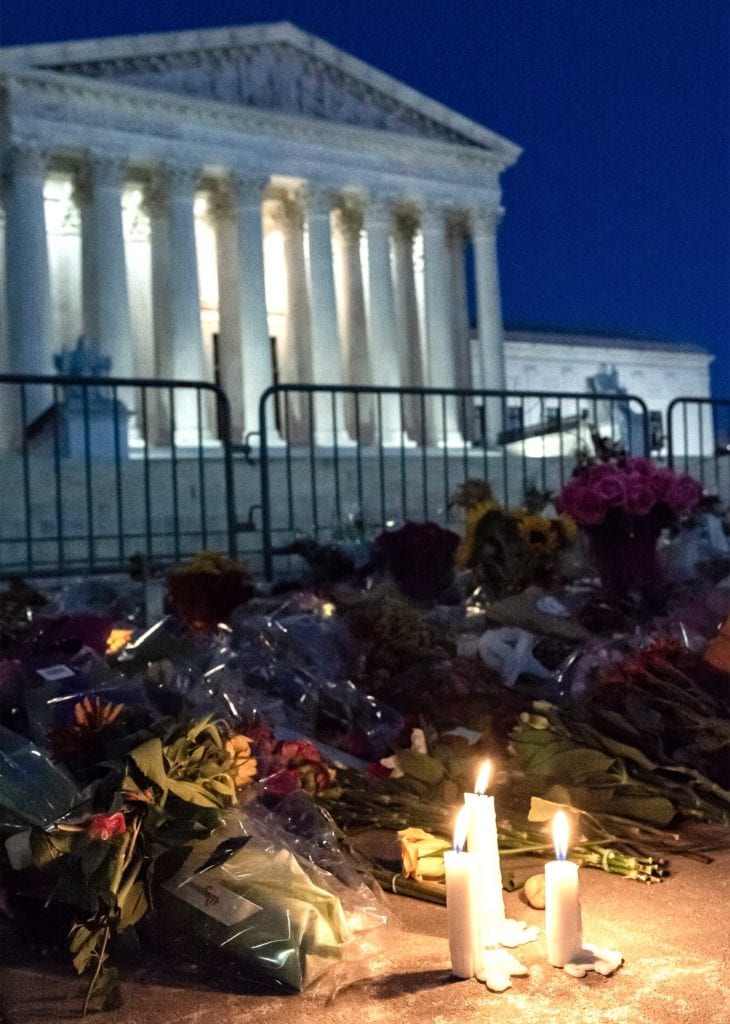
Like so many Americans across the country, I, too, am mourning the news that U.S. Supreme Court Associate Justice Ruth Bader Ginsburg has died due to complications from metastatic pancreatic cancer. She was 87. As a soft-spoken firebrand and feminist icon, Ginsburg leaves a titanic influence on the law, a legacy unmatched by any other jurists. As a feisty octogenarian on the Supreme Court bench, Ginsburg earned the moniker “Notorious R.B.G.,” and as a pop-cultural phenom, her image as the Notorious R.B.G. is on T-shirts and coffee mugs. A 2018 film, “On the Basis of Sex,” depicting Ginsburg’s life as an attorney, has inspired a new wave of young feminists and little girls to follow in her footsteps.
Ginsburg followed in the footsteps of a legal giant, too. Ginsburg was called the Thurgood Marshall of the 1970s women’s movement. Marshall’s most famous court victory was Brown v. Board of Education (1954). In referring to Marshall in a September 2014 interview in The New Republic, Ginsburg stated, “He was my model as a lawyer. You mentioned that I took a step-by-step, incremental approach; well, that’s what he did, until he had those building blocks to end separate-but-equal.”
One of Ginsburg’s famous dissents was in the 2007 case of “Ledbetter v. Goodyear Tire & Rubber Company,” on gender discrimination. Lilly Ledbetter argued pay disparity because of her gender, citing it’s a violation of Title VII of the Civil Rights Act of 1964. A 5–4 vote favored Goodyear. In a bold move, Ginsburg read her dissent publicly from the bench. In 2009, President Obama signed the Lilly Ledbetter Fair Pay Act, making it easier for women to challenge wage discrimination.
Ginsburg fought not only for women’s right but also LGBTQ+ rights, like same-sex marriage (Obergefell v. Hodges, 2015), African American voting rights (Shelby County v. Holder, 2013), rights for persons with disabilities (Olmstead v. L.C., 1999) and environmental justice (Earth v. Laidlaw Environmental Services, 2000), to name just a few on her impressive list.
Ginsburg’s lens on justice was intersectional before the word became popular in the public sphere because of her identity with a persecuted group, citing her Jewish history and the Holocaust. “My heritage as a Jew and my occupation as a judge fit together symmetrically. The demand for justice runs through the entirety of Jewish history and Jewish tradition. I take pride in and draw strength from my heritage,” Ginsburg said in a 2004 speech at the U.S. Holocaust Memorial Museum.
Ginsburg’s death comes as a crushing blow to those of us who believe in building a multicultural democracy and a participatory government, where protests are understood as a citizen’s First Amendment right. As Ginsburg is laid to rest, a fierce fight is unfolding over her successor at a time of intense political polarization and with just weeks away from the presidential election. However, in her final days, Ginsburg told her granddaughter, Clara Spera, the following: “My most fervent wish is that I will not be replaced until a new president is installed.”
Ginsburg was the first Jewish woman to sit on the supreme court. She died on the eve of Rosh Hashanah, the Jewish new year. According to Jewish tradition, a person who dies on this High Holiday is a “tzaddik,” a person of great righteousness.
Also, Justice Ginsburg was a humble person who exuded a quiet grace. In a 2015 interview with MSNBC, Ginsburg said she “would like to be remembered as someone who used whatever talent she had to do her work to the very best of her ability. And to help repair tears in her society, to make things a little better through the use of whatever ability she has.”
Ginsburg’s advocacy for justice was unwavering, and she showed it, especially with each oral dissent. In another oral dissent, Ginsburg quoted a familiar Martin Luther King Jr. line, adding her coda: “‘The arc of the universe is long, but it bends toward justice,’’’ but only “if there is a steadfast commitment to see the task through to completion.” Like the other outstanding Americans we have lost in the last couple of months – Civil Rights icon Congressman John Lewis and “Black Panther” star Chadwick Boseman – who bent the moral arc toward justice, U.S. Associate Justice Ruth Bader Ginsburg did, too.
R.I.P., RBG.
Irene Monroe is a theologian and syndicated columnist.






